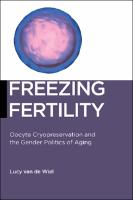Freezing Fertility
Oocyte Cryopreservation and the Gender Politics of Aging
Author(s)
van de Wiel, Lucy
Collection
WellcomeLanguage
EnglishAbstract
Welcomed as liberation and dismissed as exploitation, egg freezing (oocyte cryopreservation) has rapidly become one of the most widely-discussed and influential new reproductive technologies of this century. In Freezing Fertility, Lucy van de Wiel takes us inside the world of fertility preservation—with its egg freezing parties, contested age limits, proactive anticipations and equity investments—and shows how the popularization of egg freezing has profound consequences for the way in which female fertility and reproductive aging are understood, commercialized and politicized. Beyond an individual reproductive choice for people who may want to have children later in life, Freezing Fertility explores how the rise of egg freezing also reveals broader cultural, political and economic negotiations about reproductive politics, gender inequities, age normativities and the financialization of healthcare. Van de Wiel investigates these issues by analyzing a wide range of sources—varying from sparkly online platforms to heart-breaking court cases and intimate autobiographical accounts—that are emblematic of each stage of the egg freezing procedure. By following the egg’s journey, Freezing Fertility examines how contemporary egg freezing practices both reflect broader social, regulatory and economic power asymmetries and repoliticize fertility and aging in ways that affect the public at large. In doing so, the book explores how the possibility of egg freezing shifts our relation to the beginning and end of life.
Keywords
Egg freezing; Fertility preservation; Reproductive ageing; Oocyte cryopreservation; Reproductive studies; Frozen eggs; Reproductive politics; Gender; Egg donation; Embryo selection; Human egg; Gender Politics; History of reproduction; Media analysis; Biological clock; Single women; Lifestyle; Life course management; Reproductive decision-making; Fertility; Anticipation; Precarity; Queer theory; Preparedness; Embodiment; Affect theory; Medical imagery; Fertility insurance; Fertility markets; Fertility loans; Political economy of reproduction; Biovalue; Time-lapse embryo imaging; Patenting; Datafication; Automation; Add-on technologies; IVF; Mergers and Acquisitions; Older motherhood; Age-related infertility; Successful ageing; Posthumous reproduction; Reproductive loss; Singlehood; Cross-border reproductive care; Egg banks; Cloning; SCNT; Mitochondrial transfer; Global biopolitics of ageing; Biopolitics; Biocapital; Fertility education; Financial inducement; KinshipDOI
10.18574/nyu/9781479868148.001.0001ISBN
9781479868148, 9781479877584, 9781479868148, 9781479868148Publisher
New York University PressPublication date and place
New York, 2020Grantor
Imprint
NYU PressSeries
Biopolitics, 22Classification
Sociology: family and relationships
Reproductive medicine


 Download
Download Download
Download